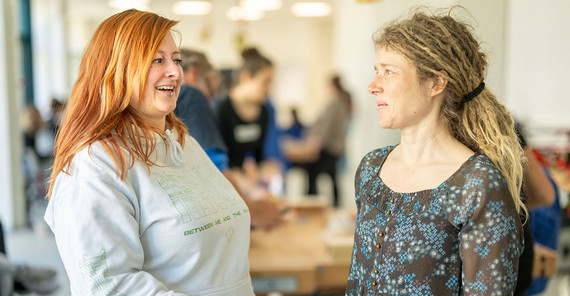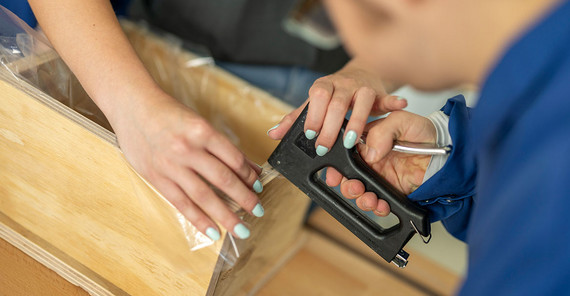Students Sonja Malkowski and Emilie Radke welcome them and begin by talking about flowers – those the group knows and particularly likes – before showing them a box in which they can plant them. They now want to build such a box together. The two women, who are studying Business and Technology (Wirtschaft-Arbeit-Technik - WAT) for a teaching degree in special needs education, have designed the lesson for this purpose. Down to the last detail. But have they really thought of everything? What can be planned? What will they have to respond to spontaneously? The four young people now standing with them at the workbench are meeting them for the first time. Not only are they of different ages and abilities, but above all they need individual support.
“This is exactly what the students have to practice and test,” says their professor Isabelle Penning, who values the close collaboration with the Comenius School, which enables practical learning and collaborative research. With the new laboratory in Golm, the experienced special education teacher has created the perfect classroom for this purpose.
Observing and improving
This morning, it is unusually busy here. Sixteen girls and boys are hammering, sawing, gluing, and screwing at four worktables, which have been set up barrier-free and equipped with everything needed for inclusive technical instruction. Two students each supervise a group of four, patiently explaining at an appropriate pace what needs to be done next, which tools are needed, how to use them, and what to watch out for to avoid injury. Meanwhile, their fellow students observe every step, noting what works and what doesn’t, where there are gaps in the concept, and what can be improved methodologically. In the next seminar, they will evaluate this and adapt their lesson plan accordingly, explain the two lecturers, Carolin Hammer and Inga Fahlberg, who have to keep an eye on all processes in the lab today.
The construction of the flower boxes is progressing well. Alister and Anuk, Luka and Alexander have screwed the cut-to-size parts together and are now starting to sand the wood. “Why?”, Sonja asks the group. “So you don’t get a splinter in your skin,” Alister knows. Then everyone runs their hands over the wood and feels how the surface changes after sanding. The two students are satisfied. Everything is going well. The young people even use a video on a tablet provided, which allows them to review each individual step of the process. “This is how we combine craftsmanship with digital learning,” Emilie explains.
The most heterogeneous school in Potsdam
At the neighboring table, where a drum is being built, a student needs a little more support. He finds it difficult to guide the hammer steadily. The supervising student takes his hand at the joint where he holds the tool. Together they hammer the nail into the wood. The others at the table help each other, for example, with gluing, when someone lacks the strength to squeeze the glue from the tube or press two parts together long enough. One boy has withdrawn into himself, and they repeatedly have to speak to and encourage him.
“The cognitive and motor skills are very different,” explains the accompanying teacher Jan Wendt from the Comenius School, which he rightly calls “the most heterogeneous school in Potsdam.” This morning, he stays in the background and watches with satisfaction as the young people participate enthusiastically and persistently. “The fact that they can quickly adapt to strangers and concentrate is also the result of eight to nine years of school,” he sums up. The goal of their training is to stay focused on an activity for a longer period of time. “It’s important for us to see whether this also works outside the classroom and later in a company, perhaps even on the regular labor market,” says Wendt, who knows from many years of teaching how much patience, empathy, and expertise it takes to support the mental development of children and young people. He gladly shares his experience with the students. “We try to get them on our side. And they also give us impulses to rethink our own teaching.”
It is not a matter of course that special schools engage in such cooperation, says Isabelle Penning, who has established a so-called campus school network with the Comenius School in Potsdam and the Biesalski School in Berlin. Based on practical needs, new subject-specific teaching approaches are developed here, tested in classrooms, and empirically researched. “How do we need to design technical education so that all students learn something?” That is the central question, says the subject didactics expert, who wants to incorporate the research results into open-access educational materials, practical teaching publications, and continuing education for teachers. And the students? Thanks to the close cooperation, they can combine practical teaching experience with research-based learning, as they are doing here in the lab today.
You can feel their pride
By now, the students have switched places at the workbenches so that everyone can take turns observing. The young people are painting their workpieces: wooden drums, candlesticks, picture holders, and flower boxes. Those who cannot hold a pen or brush use stickers for decoration. Meanwhile, some girls are being instructed on what to watch out for when using the drill press. With safety goggles on and bright red ear protectors over their ears, they dare to come closer. As the drill slowly works its way through the wood, their pride is evident.
The laboratory features a number of special machines that can help make technical manufacturing processes understandable on a small scale, says Isabelle Penning, demonstrating a foot-pedal fretsaw powered by bobbing feet like an old sewing machine. “Even elementary school children can use it,” says the professor, who promotes the lab’s possibilities in a video. In it, she also presents a tiny lathe used to make the casing of a ballpoint pen. “We still have to find out whether this really has potential or poses new challenges,” she says. After all, the lab is also a research space.
For Alister and Anuk, Luka and Alexander, it is primarily a workshop where they are now learning to use a stapler to line their flower boxes with foil. Finally, they fill them with soil and sow flower seeds. Something will grow there. That will remain.
Isabelle Penning has been Junior Professor of Didactics of Economics and Technical Education in an Inclusive Context with a focus on Cognitive Development (grades 5 – 10) at the University of Potsdam since 2021.
Developing subject-specific didactic approaches for inclusive technical education in lower secondary school (grades 5 – 10), testing them in practice, and researching them empirically is the central goal of the LLiT – Teaching and Learning Laboratory for Inclusive Technical Education, which was recognized as a practical learning center by the “Gesellschaft für Arbeit, Technik und Wirtschaft im Unterricht e.V. (GATWU)” (Society for Work, Technology, and Economics in Education) in 2023. It is part of the Business and Technology (Wirtschaft-Arbeit-Technik - WAT) subject area and serves as a university teaching format linking theory and practice, a research infrastructure for subject-specific educational questions, and an open, barrier-free design space for technical education. Teachers can visit the LLiT with their classes as an extracurricular learning site and benefit from new teaching ideas for inclusive technical education. The barrier-free, approximately 150 m2 specialist room on the Golm campus invites all who are interested to contribute their own ideas on technical education or participate in one of the workshops offered on various topics.
Further information on the LLiT: https://www.uni-potsdam.de/de/wat/index/forschung-und-entwicklung/llit-lehr-lernlabor-inklusive-technische-bildung
This text was published in the university magazine Portal - Zwei 2025 „Demokratie“. (in German)
Here You can find all articles in English at a glance: https://www.uni-potsdam.de/en/explore-the-up/up-to-date/university-magazine/portal-two-2025-democracy



